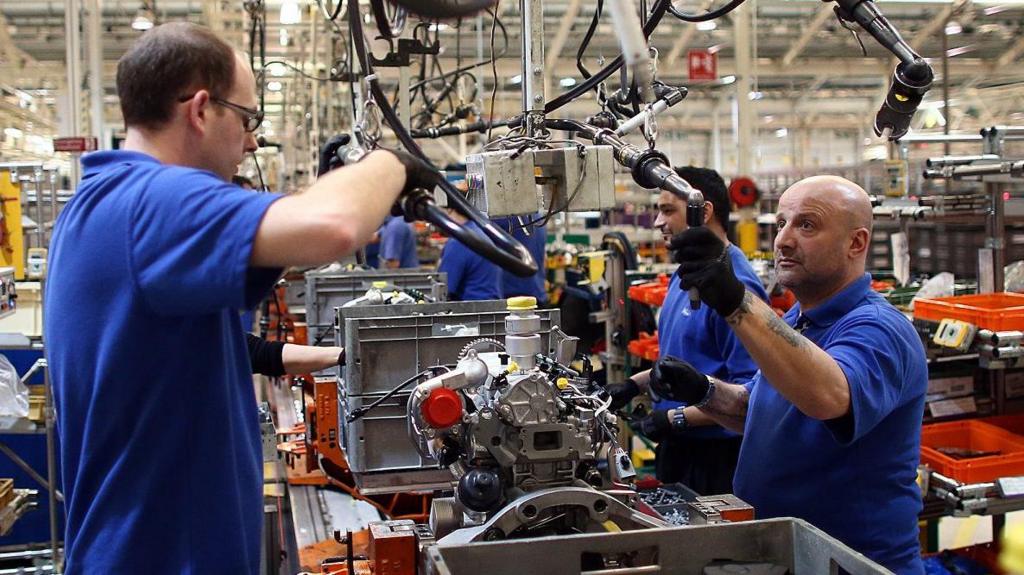The UK government is set to reveal a new trade strategy designed to bolster exports and safeguard domestic businesses amidst growing global economic uncertainties, particularly following the recent implementation of US tariffs.
The initiative aims to reduce barriers for UK companies operating internationally, while also strengthening the nation’s trade defenses to mitigate the impact of potentially unfair competition from inexpensive imports.
Concerns have been voiced in certain sectors about the possibility of cars and steel, initially intended for the US market, being redirected to the UK as a consequence of President Donald Trump’s tariffs, which have significantly increased the cost of selling goods in America.
However, Business Secretary Jonathan Reynolds has stated that the UK’s plan is designed to “ensure British businesses are protected from harm”.
The plan is scheduled to be unveiled at the annual British Chambers of Commerce (BCC) conference in London on Thursday.
Achieving a unilateral trade strategy may prove challenging, as international trade inherently involves negotiation and compromise. The focus of this plan appears to be on enhancing both offensive and defensive trade capabilities.
One offensive element of the strategy involves increased government financial support for exporters, along with assistance in navigating intricate trade regulations.
For many, however, the defensive aspects are of paramount importance, especially for industries such as steel and automotive manufacturing.
Unlike the European Union, the UK has not imposed substantial tariffs on electric vehicles manufactured in China, and existing safeguards against cheap steel imports are set to expire in 2026.
A surge in Chinese-made cars could create an uncompetitive environment for UK sellers.
At the conference, the government is also expected to emphasize its commitment to boosting the UK’s export of services and highlight recent successes, such as the signing of a free trade agreement with India after protracted negotiations.
The government will likely point to closer trading ties with the EU and its position as the first country to secure improved terms with the Trump White House regarding tariffs. At the beginning of his second term as president, Trump announced a series of import taxes on goods from other countries, arguing they will boost American manufacturing and protect jobs. He argues that America has been taken advantage of by “cheaters” and “pillaged” by foreigners.
However, Andrew Opie of the British Retail Consortium, representing retailers, suggests that while the UK’s trade agreements are beneficial, a more significant advantage for consumers would be “swift action” by the Chancellor on the abuse of the “de minimis” rule, which permits low-value packages to enter the UK without being taxed.
The use of such rules has increased significantly over the past decade. While intended for consumers purchasing goods for personal use from abroad, some businesses have exploited it to avoid paying taxes on their goods.
Critics argue that this has provided overseas companies such as Shein and Temu with an unfair advantage over British businesses.
Mr. Opie stated that “the limited checks and balances on such goods entering the country put consumers at risk from products that do not meet the UK’s high standards, and retailers at risk from competition by those who would sell such goods”.
The trade plan follows the government’s unveiling of its 10-year industrial strategy, which included a blueprint for reducing energy costs for thousands of businesses by exempting them from certain green energy taxes.
Ministers hope that following the introduction of tax increases for businesses last autumn – leading to higher costs, including employer National Insurance contributions – this summer’s series of strategies will serve as evidence that the government is supportive of the business community.
Birmingham’s Jewellery Quarter, established 250 years ago, accounts for 40% of jewellery production in the UK.
US and Chinese counterparts may engage in trade discussions this week, according to Trump administration officials.
The 27-member bloc asserts that Donald Trump’s actions undermine efforts to reach an agreement, and warns of potential “countermeasures.”
The court ruling raises questions about whether the wider so-called reciprocal tariffs due in July will ever come in to effect.
Our political editor reflects on the UK’s deal with the EU to smoothen frictions in trade.

